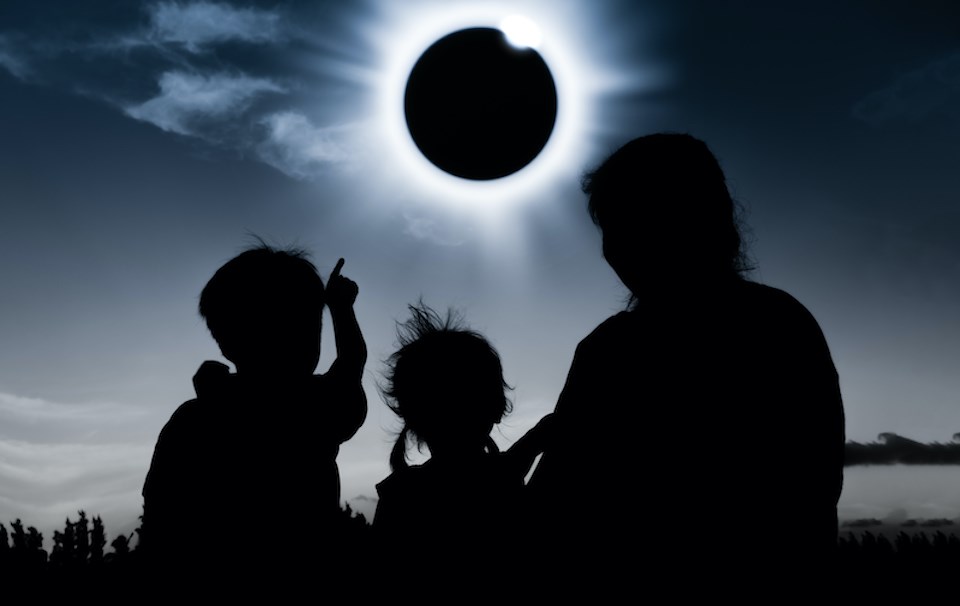I remember my first solar eclipse well because I screwed it up. My back turned to the sun for safety reasons, I got to watch my classmates watch the eclipse through the welding glasses they made and I messed up. I did get a consolation shoebox with a couple of holes punched into it, but I think I was looking in the wrong hole the entire time because I didn’t see anything—although I pretended I did.
There have been a few opportunities since then to take in a total solar eclipse, but I’ve missed them all for various reasons: slept in once, editing in a windowless room at school and forgot about it, the usual bad weather, and so forth. But while I’ve never seen more than a very partial solar eclipse in all my years on Earth, I still get the general concept—balls orbiting around one another in space that occasionally line up with spectacular effect. You don’t need to be an astrophysicist to understand it.
And yet…
This latest eclipse felt like a canary-in-the-coal-mine moment for where we are as a society. Either we’re getting dumber or dumb voices are being amplified so loudly that there’s little practical difference.
There were citizens in Michigan who begged their mayor to stop the solar eclipse, concerned about a sudden influx of eclipse tourists mobbing the gas station.
We had a sitting member of the U.S. Congress telling people to “repent” because of the combination of the eclipse and a recent New York/New Jersey earthquake. Astronomers can predict solar eclipses hundreds of years in advance. They actually happen every two or three years, it’s just that we just don’t talk about them all because they most often occur over the Arctic or Antarctic. The earth also rumbles 55 times a day on average, mostly in oceanic areas. It’s not that big of a coincidence.
We had QAnon and other conspiracists telling people not to believe government propaganda about staring at the sun, like “they”—Big Astronomy I presume—were hiding something BIG. Like aliens. Or something to do with changing the Giant Bulb, the Earth being flat and all. Still others compared the medical advice to wear special glasses to the recent COVID mandate to wear masks—because no amount of death (over 1.5 million in North America) will ever convince some people it wasn’t a hoax.
Several school boards, including Toronto’s, cancelled school for the day out of concern that students would ignore the advice of teachers and damage their eyes during a time when the schools were liable for their safety. Making kids stay home, only the parents could be blamed.
Not looking at a solar eclipse seems like it should be common knowledge by now, as well as common sense, yet one of the biggest trending search terms on Google after the eclipse was “Why do my eyes hurt?”
In some cases, people can be forgiven for their sore eyes. There was an alert on Amazon a couple days before the eclipse that some of the glasses they were selling by the thousands did nothing to protect the wearers. The fact that people can sell protective equipment to so many people through a major website without meeting any standards also seems dumb to me and says a lot about where we are as a society.
The last totality to hit eastern North America wasn’t all that long ago either: it happened in 2017. That was the one where the President of the United States himself ignored all the advice of optometrists and health professionals and snuck a peek at the eclipse from the steps of the White House.
It’s not like we haven’t gone through all of this before, time and time again. And yet idiocy ensued. If anything, it got worse.
How do we fix this? How can we get back to being the kind of society where it isn’t a controversial or debatable thing when a medical professional to tell you something like, “Don’t look at the eclipse, you can damage your eyes?” And I don’t just mean eclipses, but also other important things like vaccines and wearing helmets.
We used to defer to experts. Now everybody is their own expert, and far too many people don’t see the difference between the entire medical profession saying something and some rando saying the opposite on YouTube and TikTok. They’re not equal.
You could argue that government has an important role to play in consumer protection, that social media companies have an ethical obligation to not amplify dangerous nonsense—and you’d be right on both counts. But any attempt by government to remove misinformation from the internet is automatically condemned as censorship. And social media companies don’t really want to do anything that hurts business; they know controversy drives engagement. Some have their own political motives.
Far too many of us prefer to get fed lies from conspiracy nuts, foreign governments, bad actors, unqualified and self-appointed experts, people looking to profit from misinformation, and whatever the hell Elon Musk is to government intervention. We can’t dam the flood of dangerous misinformation we know is happening because of the risk of abuse that might happen if we ever tried to clean up the digital commons.
The next opportunity to see a solar eclipse is in 2026m, if you’re up for a trip to Europe. The next one to hit Alberta and B.C. is in 2044. I can only wonder what people will be saying about it then.




